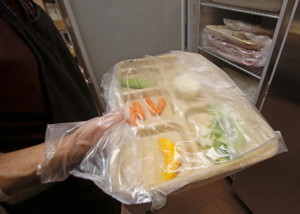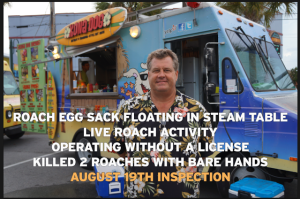No one invites me for dinner; they know I’m a food safety asshole (who carries a tip-sensitive digital thermometer in his backpack).
 I don’t like charity cooking, I don’t like when I don’t know how the food was prepared, and I don’t like sausage sizzles, apparently part of Australian culture.
I don’t like charity cooking, I don’t like when I don’t know how the food was prepared, and I don’t like sausage sizzles, apparently part of Australian culture.
I want to celebrate food, I want to eat and share stories, but there are so many tales every day of people messing up the basics.
When we went to a (ice) hockey tournament a couple of months ago, I volunteered to call up the local health types and ensure a sausage sizzle was OK.
Sure, as long as it’s for charity.
I had to take a 16 hour course to coach little kids in hockey in Australia (because my Canadian experience didn’t count) but needed nothing to prepare food that could sicken those same little kids.
So this seems like a bad idea.
We could soon be bidding farewell to the fish and chip shop and saying ta-ta to the takeaway Thai if a plan to transform the way we eat, in the same way Uber has shaken up how we travel, takes off.
 And, industry experts have warned that if restaurants don’t find a way to respond to the challenge they will be the losers as Australians turn to their next door neighbours for dinner rather than head out to the local takeaway.
And, industry experts have warned that if restaurants don’t find a way to respond to the challenge they will be the losers as Australians turn to their next door neighbours for dinner rather than head out to the local takeaway.
However, there are concerns bureaucratic red tape could halt any moves to create a new future of food in its tracks.
Last week, 100 of Australia’s ‘foodie-prenuers’ gathered in Sydney for HackFood, a meeting place to thrash out the most innovative ideas to transform the food industry.
One of the most promising initiatives to emerge for the gathering, and one that is already in development, could see Australians turning their backs on takeout forever.
“It’s the UberX and Airbnb of home cooked meals,” said Jennifer Callaghan of the HomeCooked app she has created with partner Josh MacNamara.
Ms Callaghan said there were currently three options for people to eat: prepare at home, eat at a restaurant or order takeout. The new app added a fourth choice — local people cooking dinner for you.
“A home cook could say I’m going to make 10 servings of Thai green curry on a certain date and the person wanting to eat could flick through and see what’s cooking in their local area.
“You could request and pick it up then or order ahead for another day,” said Ms Callaghan who envisaged busy professionals stopping by their neighbours for takeaway containers of Indian goat curry or mac and cheese on the way home from work.
 While similar apps, such as MyTable, are available in countries such as the US and India, she said no such technology existed in Australia.
While similar apps, such as MyTable, are available in countries such as the US and India, she said no such technology existed in Australia.
According to IBISWorld the Australian takeaway food industry has annual revenues of $4bn and employs around 15,000 people with Eagle Boys and Domino’s some of the biggest players.
The business partners had done research that showed 80 per cent of people in inner city neighbourhoods would be open to buying a home cooked meal from a neighbour as an alternative to a takeaway.
Students and stay-at-home mums might jump at the idea of cooking for other local people, said Ms Callaghan who hope to launch HomeCooked in early 2016.
However, the challenges to this new way of eating are significant with established players unlikely to welcome a digital newcomer disrupting the status quo and food safety regulations designed around traditional food outlets.
Last year, Bunbury schoolgirl Chelsea-lee Downes found her roadside stall selling lemonade and cupcakes shut down by the local council because the food was produced in a domestic rather than commercial kitchen.
All cooks would have to take out insurance and there would be a “verification process” similar to that used by Airbnb, said Ms Callaghan. But she admitted the legality of selling food cooked up in a standard kitchen was unclear. “It’s a grey area and we’re talking to people in the industry around the ways of overcoming those areas but there has been a paradigm shift in how we access transport, lifestyle, and now food and things are changing no matter what,” she said.
 Managing principal of food compliance specialists FoodLegal, Joe Lederman, told news.com.au regulations covering food preparation varied from place to place. “It’s a question of attitude, some regulators are in the business of encouraging new business and some are hostile to anyone who’s not commercial.
Managing principal of food compliance specialists FoodLegal, Joe Lederman, told news.com.au regulations covering food preparation varied from place to place. “It’s a question of attitude, some regulators are in the business of encouraging new business and some are hostile to anyone who’s not commercial.
“It’s a similar experience with taxis, in some places they are more open and others take the approach it’s not the way forward and should not be done.”
 The SmartLabel system, which also will allow consumers to find the information on the web as through the phone-based QR code on package labels, is designed in part to address demands for labeling of biotech foods.
The SmartLabel system, which also will allow consumers to find the information on the web as through the phone-based QR code on package labels, is designed in part to address demands for labeling of biotech foods.











